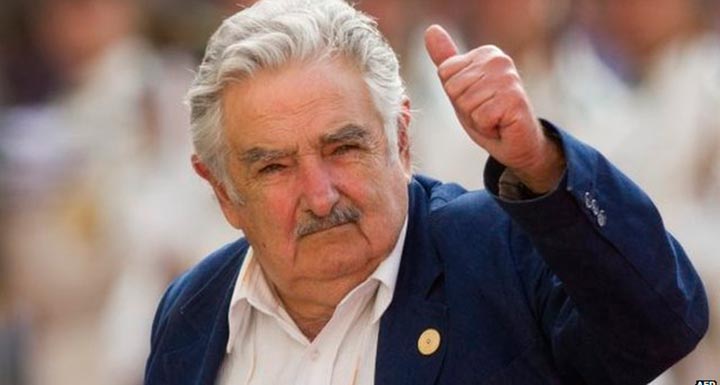
Mujica: Political integrity
The departure of José Mujica from the presidency of Uruguay on March 1, which gives a second term to Tabaré Vázquez, also a member of the Broad Front (left of center), makes it pertinent and necessary to examine the political and ethical work of a personage who is, in many senses, emblematic in Latin American and world politics.
A former militant in guerrilla organizations, arrested on multiple occasions and imprisoned for more than a decade under torture and isolation, Mujica represents a generation that — as he himself has pointed out – attempted to change the world and was overrun by the dictatorial and repressive governments that it confronted.
However, unlike other representatives of former guerrilla groups in the region, the president’s trajectory from clandestinity to public office seems not to have upset the pillars of a political agenda that is fundamentally based on the search for social justice, historical truth, and democracy.
Mujica’s case is paradigmatic in that it presents as a false dilemma the alleged tension between ethics and politics, as regards the exercise of power.
The demureness and modesty of the president’s life, his refusal to amass wealth through his post, and the way he reevaluates the fundamental ethical values, such as honesty and transparency, have been projected unequivocally onto each of the actions of his administration, and that has contributed to demythicize political power in what many see as the most advanced democracy in Latin America.
The most evident example of that intermingling of ethics and politics is the fact that the Eastern Republica of Uruguay has been free of corruption scandals, of the inexplicable enrichment of functionaries, and of embezzlement, problems that have affected much larger nations, such as Argentina, Brazil and Mexico.
A mixture of moralization and reestablishment of the social fabric can also be found in a presidency that has reduced poverty and unemployment, has notably consolidated its farm sector and has made Uruguay one of the nations most committed to the development of renewable-energy sources.
It is instructive that, at a historic moment when the world’s political regimes undergo a crisis of representativeness because of the gap between the political classes and ruling elites on one side and the societies on the other, Mujica’s figure is recognized by sympathizers and opponents as the logical correlation of economic and social advances in the past five years.
That has given Uruguay’s institutions a recognition and legitimacy that today are unthinkable in other countries in the region and the world.
It will be up to the next administration, as well as the lucid and committed sectors of Uruguayan society, to buttress the political, social and economic changes made during Mujica’s presidency, thus helping to consolidate a process of institutional renewal that, beyond its flaws, has valuable and indispensable aspects for the full development of the region.
(From the Mexican newspaper La Jornada / Translate: Progreso Weekly.)


